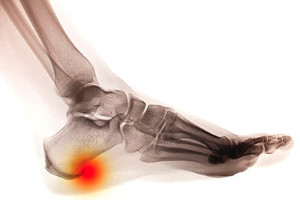What Causes Plantar Fasciitis?
Monday, 25 November 2019 00:00 The symptoms that are common in the condition that is referred to as plantar fasciitis typically consist of discomfort in the heel and arch area, pain while taking the first steps after arising, and difficulty in raising the toes off the floor. Mild relief may be found when the foot is elevated, and it may help to wear insoles in the shoes. Many patients find it beneficial to incorporate gentle stretches into their daily routines, in addition to practicing exercises that have no impact on the feet, which can include swimming. This painful condition may be caused by standing on hard surfaces for the majority of the day, or from wearing shoes that do not fit correctly. If you have developed this ailment, it is advised that you speak to a podiatrist as quickly as possible who can offer orthotics that are specifically designed for you feet as a treatment option.
The symptoms that are common in the condition that is referred to as plantar fasciitis typically consist of discomfort in the heel and arch area, pain while taking the first steps after arising, and difficulty in raising the toes off the floor. Mild relief may be found when the foot is elevated, and it may help to wear insoles in the shoes. Many patients find it beneficial to incorporate gentle stretches into their daily routines, in addition to practicing exercises that have no impact on the feet, which can include swimming. This painful condition may be caused by standing on hard surfaces for the majority of the day, or from wearing shoes that do not fit correctly. If you have developed this ailment, it is advised that you speak to a podiatrist as quickly as possible who can offer orthotics that are specifically designed for you feet as a treatment option.
Plantar fasciitis is a common foot condition that is often caused by a strain injury. If you are experiencing heel pain or symptoms of plantar fasciitis, contact Dr. Scott Shrem from Garden State Foot & Ankle Center. Our doctor can provide the care you need to keep you pain-free and on your feet.
What Is Plantar Fasciitis?
Plantar fasciitis is one of the most common causes of heel pain. The plantar fascia is a ligament that connects your heel to the front of your foot. When this ligament becomes inflamed, plantar fasciitis is the result. If you have plantar fasciitis you will have a stabbing pain that usually occurs with your first steps in the morning. As the day progresses and you walk around more, this pain will start to disappear, but it will return after long periods of standing or sitting.
What Causes Plantar Fasciitis?
- Excessive running
- Having high arches in your feet
- Other foot issues such as flat feet
- Pregnancy (due to the sudden weight gain)
- Being on your feet very often
There are some risk factors that may make you more likely to develop plantar fasciitis compared to others. The condition most commonly affects adults between the ages of 40 and 60. It also tends to affect people who are obese because the extra pounds result in extra stress being placed on the plantar fascia.
Prevention
- Take good care of your feet – Wear shoes that have good arch support and heel cushioning.
- Maintain a healthy weight
- If you are a runner, alternate running with other sports that won’t cause heel pain
There are a variety of treatment options available for plantar fasciitis along with the pain that accompanies it. Additionally, physical therapy is a very important component in the treatment process. It is important that you meet with your podiatrist to determine which treatment option is best for you.
If you have any questions, please feel free to contact our office located in Hazlet, NJ . We offer the newest diagnostic and treatment technologies for all your foot care needs.
Blog Archives
- April 2025
- March 2025
- February 2025
- January 2025
- December 2024
- November 2024
- October 2024
- September 2024
- August 2024
- July 2024
- June 2024
- May 2024
- April 2024
- March 2024
- February 2024
- January 2024
- December 2023
- November 2023
- October 2023
- September 2023
- August 2023
- July 2023
- June 2023
- May 2023
- April 2023
- March 2023
- February 2023
- January 2023
- December 2022
- November 2022
- October 2022
- September 2022
- August 2022
- July 2022
- June 2022
- May 2022
- April 2022
- March 2022
- February 2022
- January 2022
- December 2021
- November 2021
- October 2021
- September 2021
- August 2021
- July 2021
- June 2021
- May 2021
- April 2021
- March 2021
- February 2021
- January 2021
- December 2020
- November 2020
- October 2020
- September 2020
- August 2020
- July 2020
- June 2020
- May 2020
- April 2020
- March 2020
- February 2020
- January 2020
- December 2019
- November 2019
- October 2019
- September 2019
- August 2019
- July 2019
- June 2019
- May 2019
- April 2019
- March 2019
- February 2019
- January 2019
- December 2018
- November 2018
- October 2018
- September 2018
- August 2018
- July 2018
- June 2018
- May 2018
- April 2018
- March 2018








